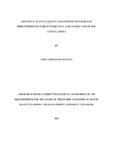| dc.content | This study sought to analyse the influence of Total Quality Management (TQM) processes on improvement of forest products in Keiyo South Kenya Forest Service forests in Elgeyo Marakwet County, Kenya. The study looked into the influence of TQM on improvement of Forest products. The TQM constructs to be studied were planning, control, staff motivation and staff training. The dependent variable of the study was the improvements of forest
products which included timber emanating from exotic species of cypress, pine and Blue gum trees which were the main tree species planted for timber production in Kenya. The objectives of the study were: To determine the influence of planning on quality of forest products, to determine the extent to which staff training influence the quality improvement of the forest products, to assess the influence of control on the quality improvement of forest
products and to establish the influence of motivation of staff on quality improvement of forest products. Both quantitative and qualitative approaches were applied to process, to analyse and interpret the data collected from the field. Data was analysed using descriptive statistics and inferential statistics. Descriptive statistics was used and included; percentages, frequencies, standard deviations and means. This study was prompted by the fact that
Plantation establishment is a long term enterprise spanning duration of between 20 to 30 years before returns are realized. This calls for continuous monitoring and evaluation of processes if quality products (timber) are to be achieved. Various conceptual; theories related to this research were discussed to reinforce the study. These theories which were key to quality management system are PDCA (Plan-Do-Check-Act), which was made popular by
Dr. W. Edwards Deming (1994), Zero Defects concepts which was pioneered by Philip Crosby (2001), Benchmarking concept (Mahamed A, 1995) and Kaizen Philosophy which is a Japanese word for maintenance and improvement. The conceptual framework clarifying relationship between dependent and independent variable; together with their indicators and
constructs respectively are amplified. Significance of the research study is clearly stated in terms of information as to whether the organization activities are moving on the right direction towards the production of quality forest products. The study employed survey research design that used questionnaires. Sampling was done using Census enquiry sampling
design which included all the workers in the Kenya forest service from Keiyo South Sub county were interviewed. Data coding was done upon the return of the questionnaires from the field. Data entry and analysis was done by the help of Statistical Package for Social Sciences (SPSS) version 20. In addition, qualitative data from open ended questions in
surveys and interviews were processed and analysed. The results of the data analysis process were presented using tables. The study targeted a total of 60 respondents which comprised of 12 respondents from Kipkabus, 16 respondents from Kaptagat, 15 respondents from Sabor forest station and 13 respondents from Penon forest stations of Keiyo South Sub-County.
The relationship between the variables was processed through correlation analysis and the following results were obtained. The relationship between planning and improvement of forest products show there is high positive relationship between planning and improvement of forest products, this was proved with the p value = 0.993 and r= 0.000. At 95% confidence
level, there was significant relationship between the control process in place and the improvement of forest products. This was so since p=0.544 and r = 0.00 giving us a positive correlation. There was no significant correlation between staff straining and Improvement of forest products. This is because the value of p = 0.075 which was very small compared to 0.5 level of significance. There was no significant relationship between staff motivation and improvement of forest products. The value of p=0.181 indicated a positive relationship but not a significant relationship. In conclusion it was found that KFS was male dominated organisation accounting for 93.3%. It was also an ageing staff where 84.7% of the staff were above 30 years | |

